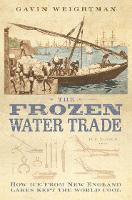


|
|
| book details |
The Frozen Water Trade
By (author) Gavin Weightman

|
| on special |
normal price: R 330,95
Price: R 297,95
|
| book description |
The story of the 19th-century ice trade, in which ice from the lakes of New England – valued for its incredible purity – revolutionised domestic life around the world. In the days before artificial refrigeration, it was thought impossible to transport ice for long distances. But one man, Frederic Tudor, was convinced it could be done. This is the story of how, almost single-handedly, and in the face of near-universal mockery, he established a vast industry that would introduce the benefits of fresh ice to large parts of the globe. Thanks to Tudor, the American fashion for drinks ‘on the rocks’ spread to tropical areas such as the West Indies and British India. By the 1830s fleets of schooners carried the frozen cargo, packed with sawdust and tarpaulins for insulation, to all corners of the world. The harvesting of the ice from New England’s lakes employed thousands of men. The frozen water trade had a profound influence on the tastes of a large part of the world, but with the development of artificial cooling systems in the first quarter of the 20th century, the huge industry established by Frederic Tudor vanished as if it had never been.
| product details |

Normally shipped |
Publisher | HarperCollins Publishers
Published date | 17 Mar 2003
Language |
Format | Paperback / softback
Pages | 224
Dimensions | 198 x 129 x 14mm (L x W x H)
Weight | 188g
ISBN | 978-0-0071-0286-0
Readership Age |
BISAC | history / social history
| other options |
|
|
|
To view the items in your trolley please sign in.
| sign in |
|
|
|
| specials |
|
|
|
This first comprehensive biography of Cecil Rhodes in a generation illuminates Rhodes’s vision for the expansion of imperialism in southern Africa, connecting politics and industry to internal development, and examines how this fueled a lasting, white-dominated colonial society.
|
Let's stare the future down and, instead of fearing AI, become solutionists.
|
|
|
|